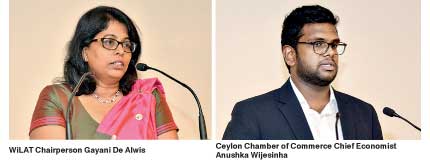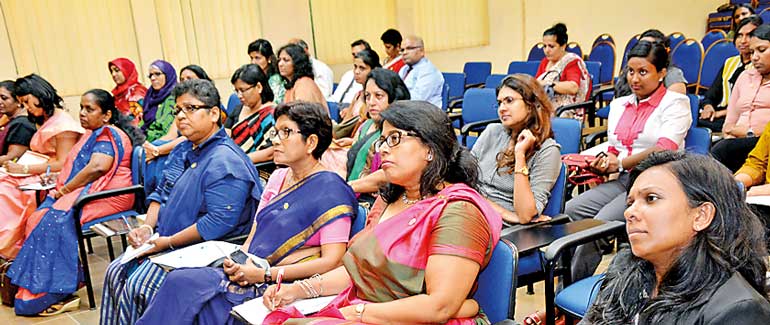Wednesday Feb 25, 2026
Wednesday Feb 25, 2026
Monday, 18 April 2016 00:00 - - {{hitsCtrl.values.hits}}
By Shannine Daniel
Logistics and transport are key in Sri Lanka’s strategy of becoming a serious player in the global economy said Ceylon Chamber of Commerce Chief Economist Anushka Wijesinha.
“The sub-sector of logistics and transport is becoming increasingly important in the country’s economy although its share has not changed too much in the past five years or so,” Wijesinha stated.
He made these comments at the third AGM of the Women in Logistics and Transport (WiLAT) held recently.
The sector now accounts for about 11% of GDP in the Sri Lankan economy and 20% of the total service sector.
“Sri Lanka’s service sector is about 60% and logistics and transport is a big chunk of that. Year and year growth has been above the overall GDP growth for the country and between 2010 and 2015 the sector expanded by about 40%,” Wijesinha stressed.
He went on to state that over the last five years this sector has contributed about 12% to the overall growth in GDP.
Along with sectors such as tourism, IT enabled services, software, niche valued added manufacturing, agri-business, and property development international logistics offers many lucrative opportunities for business highlighted Wijesinha.
“Given the country’s strategic location, international logistics linked to our ports and airports is an opportunity which we can capitalise on,” he asserted.
“Transport such as shipping, aviation and related activities amount to 35% of Sri Lanka’s total services exported. It shows that we have begun to leverage on the strategic advantage of location,” he revealed.
Compared to some of the other countries in the region, when it comes to international logistics Sri Lanka is performing much better with Vietnam at 25%, Thailand at 10% and Malaysia at 12% asserted Wijesinha.
Furthermore he went on to say that Sri Lanka is expected to attract an increasing share of trade in the Indian Ocean.
The liner shipping connectivity index, which measures how well countries are connected to global shipping networks, scores Sri Lanka at 53 he added.
According to estimates by KPMG trade in the Asia Pacific region is said to grow at around 12% each year. The port of Colombo is already seeing about 15% Annual Growth in transshipments, with the private players being extremely competitive.
“This shows that Colombo port can be a capable transshipment company, however we do have to improve in terms of connectivity,” opined Wijesinha.
Air transport essential for globalisation and international trade
Speaking about the importance of air transport Wijesinha stated that it is essential in terms of getting the best out of globalisation and international trade.
“Globally nearly 35% of trade is carried out through air transport and nearly half of the global air cargo is carried on passenger flights. So a growth in passenger flights has a knock on effect on cargo transport,” he stated.
“We have ample evidence to show that liberalisation of air transport reduces the cost of trade especially in higher value added supply chains such as parts and components, electronics, perishable food, cut flowers and also services such as tourism,” he continued.
He further stated that air transport plays an imperative role when it comes to parts and components trade, especially for companies which are looking to get into huge global production networks. This is because of global specialisation and the ‘slicing and dicing of the entire production chain’ opined Wijesinha.
“If Sri Lanka wants to get into these global production networks, air transport connectivity will be important. We need to look at important things such as the bilateral services agreements. We also need to look at all factors encompassing the air services sector if we are serious about leveraging on it,” said Wijesinha.
“Unfortunately this area receives relatively little attention from economists and policy makers, who need to play a role in developing this sector,” he further stated.
He went on to say that Sri Lanka is at a unique point in its economic trajectory and which makes it a very interesting as well as challenging time since the country is going through a transition on many fronts.
Highlighting three of these transitions Wijesinha went on to say that they affect diverse sectors in the country’s economy, and the logistics and transport sector needs to be mindful of these changes to develop their businesses.
The transition that is taking place on the international stage is advantageous as it creates more opportunities for trade and investment he opined.
“Sri Lanka is now trying to consolidate ties with countries like China and India and forge new alliances with countries like Singapore, Thailand and Turkey,” emphasised Wijesinha.
“Sri Lanka needs good relationships with many countries in order to remain globally relevant and globally positioned. Our relations with these countries ultimately affect business,” he added.
According to a survey conducted by the Ceylon chamber of Commerce it was identified that potential investors are most influenced by Sri Lanka’s favourable geographic location and access to regional markets. Over 33% of the respondents stated that geographic location and access to regional markets are two of the most attractive factors when it comes to investment in Sri Lanka emphasised Wijesinha.
Wijesinha added that we have had many visits from diplomats, envoys and trade delegations due to one simple and powerful fact; Sri Lanka’s unrivalled geographic location.
“India offers us a wide range of opportunities especially since E-commerce is thriving there,” he added.
He also revealed that China is interested in leveraging on Hambantota’s port and airport to use as a logistics and warehousing facility for their ecommerce facilities within South Asia particularly with India.
Speaking about the FTAs with Pakistan and India Wijesinha also said that Sri Lanka will be truly unique in having preferential market access to a market of 2.7 billion.
Second only to Singapore
“We are second only to Singapore with preferential FTA related market access to other countries in the market,” he asserted.
However he went on to say that we must focus on our trade and investment policies to leverage on this opportunity, particularly our openness to trade.
“This is where we face a glitch because over the last decade or so we have slipped back substantially. In 2005 we were a nation where trade was at 80% of GDP but by 2015 this had fallen to 55%.This means we are less open towards trade now,” opined Wijesinha.
He also spoke about the demographic and institutional transition that is taking place, stating that it is a very challenging one which plays an important role in creating business opportunities.
“Due to this transition we’re seeing a huge amount of consultation and dialogue between the private sector and the public sector, between ministries and agencies and chambers of commerce. And there’s an opportunity for groups such as this to be a part of shaping and influencing policies and reforms,” he stated.
Furthermore Wijesinha spoke about the middle income transition.
“Currently Sri Lanka is classified as a lower middle income country. In 2008 we transitioned from a low income status to lower middle income status and very soon we will be classified as an upper middle income country by international benchmarks,” he affirmed.
He stated that this transition doesn’t come easy as well since it brings with it a lot of challenges in terms of growth drivers, governance and inclusiveness across gender, different ethnicities or regions and provinces.
Furthermore Wijesinha stated that women are underrepresented in industry and commerce in Sri Lanka, notably in areas such as politics, tourism, IT, engineering and of course transport and logistics.
“In this sector the ratio is rather staggering as 97.1% of the total numbers of people employed are men while only 2.9% are women,” he revealed.
“We need to address this as it is not just an equality issue, but an economic issue and we cannot expect the economy to grow at 7%-8% as we have an ageing population and only 35% of women are employed. Therefore we need to see an increase in female labour force participation,” Wijesinha added.
Speaking about the AGM he stated that it was very impressive to see a professional forum dedicated to bringing together and promoting women in a sector which by any measure is considered as a non-traditional occupational choice for women.
WiLAT Sri Lanka Chairperson Gayani De Alwis in her address stated that WiLAT in its short life has witnessed a strong momentum and has reached a certain milestone.
“It is the challenge that lies before all of us, to shape and direct this forward march to ensure we reach many more milestones in the long struggle for greater diversity and parity in the logistics and transport sector to create an environment that is truly inclusive,” commented De Alwis.
Over the last year, WiLAT has taken several initiatives to spread awareness and create a more gender balanced sector.
A mentoring program introduced by WiLAT Sri Lanka was adopted as the global program with De Alwis appointed to lead this initiative globally. The annual WiLAT walk was successful in drawing in over 700 participants from the sector, and this too will be adopted as a Global Walkathon in June every year.
Among the activities that took place in 2015, a membership drive and career guidance program was conducted at the Ocean University, and it is intended to take place in General Sir John Kotelawala Defence University (KDU), University of Moratuwa, Colombo International Nautical Engineering College (CINEC) and Sri Lanka Institute of Information Technology (SLIIT).
With the objective of promoting the sector of Transport and Logistics as a field of discipline among female university student, a career fair and quiz which was jointly organised with WISTA was conducted last year as well.
De Alwis stated that she is confident that WiLAT will make its own significant contribution to gender parity and women’s empowerment in Sri Lanka and across the globe.

Pix by Upul Abayasekara